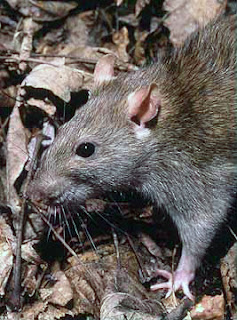This week’s blog is a two-fer. [Two rat stories in one week!] The first is about a bunch of drunken rats
while the second is about rats as a good source of protein in developing countries.
Story one: on a
bender
Scientists at Scripps Research Institute located on the campus
of FAU in Jupiter, suggest that “binge-drinking
rodents suggests that knocking back a few drinks every few days may swiftly
reduce one’s capacity to control alcohol intake” (Scripps, 2012).
Drinking heavily intermittently, rather than drinking some
regularly can make your brain transition from social drinking to binge drinking
and greater alcohol dependence. Brain functions were altered in the binge
drinkers. Working memory was altered.
To find out more details of the study you may read the
Scripps blog
post here or link to the full article here.
Story 2: Rats for
dinner
In many tropical parts of the world, rodents are considered
a normal food source. They provide a
good source of protein and also contain essential amino acids necessary for
healthy humans (Fieldler, 1990). Another
common practice in developing nations is consuming bushmeat (wildlife either
hunted or found carcasses). Both practices pose problems for emerging infectious diseases. Consuming
wildlife can transmit diseases such as ebloa, monkeypox, HIV, anthrax and salmonella
(Wolf, et. al, 2005).
Rats have been a delicacy in rural areas of Vietnam (and
other countries) for centuries. In 1994,
the avian flu outbreak saw a rise in rat consumption in Asia (Hookway, 2008). There
are approximately 42 societies that consume rodents on a regular basis
(Fleldler, 1990).
Africa is experimenting with commercial
breeding facilities for domesticating wild rats as a food source (Fleldler,
1990). With shrinking wildlife populations and rise in infectious diseases,
maybe raising rats is a viable solution. Read more about both rat stories from
the links below.
Students, can you find more recent articles on humans
consuming rats? Check it out by suing Searchwise.
References:
Hookway, 2008 http://search.proquest.com/docview/399020506
Wolfe, N. D. Wolfe, Daszak,P., Kilpatrick, A. and Burke,
D.S., 2005. Bushmeat Hunting, Deforestation, and Prediction of Zoonotic Disease
Emergence. Emerging Infectious Diseases
• www.cdc.gov/eid • Vol. 11, No. 12


No comments:
Post a Comment